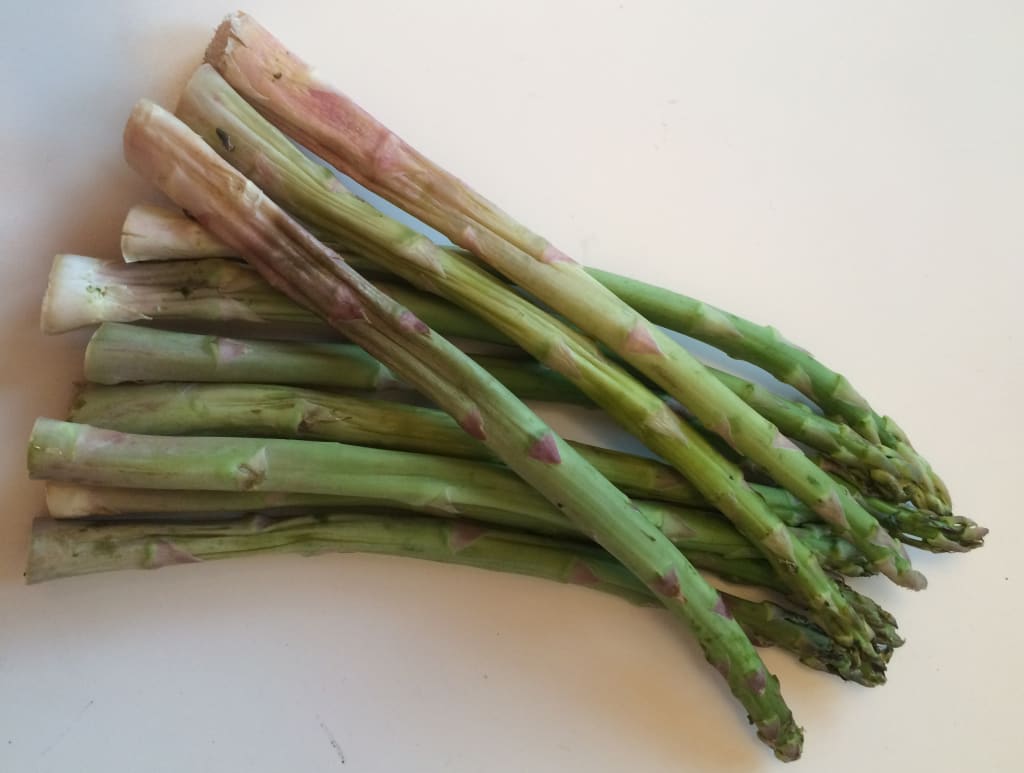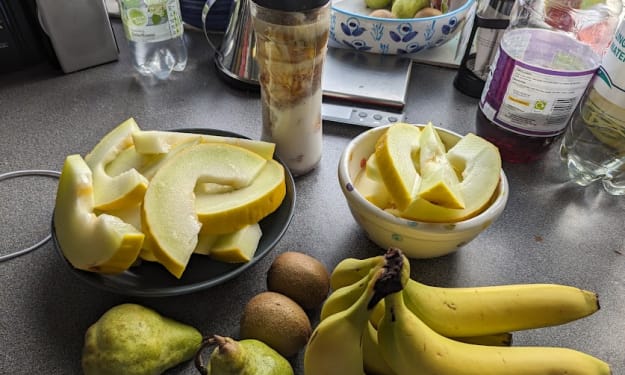Asparagus
A taste of childhood and a walk through history

Chichester Cross in Chichester, Sussex, England is an octangular stone building built some time between 1497 and 1503. It marks the centre of where the old street market used to be. The market and its traders have moved to what is now an anonymous open car park apart from one. A man with a mobile stall that can be pulled away by hand when the day’s business is done.
It is stocked with whatever fruit and vegetables are available and in season.
On this early June sunny morning the light illuminated the vibrant colours of fresh oranges, strawberries, raspberries, bananas and asparagus. It was the asparagus that caught our attention as it was advertised at £2 a bundle with each bundle consisting of approximately twenty thick spears.
We were tempted.
‘What can I get you guv?’ the vendor asked us.
‘Two bundles of asparagus please?’ my wife and I replied in choral unison.
Swifter than a magician making a rabbit disappear into a top hat the vendor slipped two bundles into a carrier bag which he handed over to us. Or, as Caesar Augustus is reputed to have said ‘Citius quam asparagi coquunter’ which means ‘quicker than asparagus is cooked’.
We paid the £4 and were just about to walk away.
‘Have you tried it raw?’ the vendor asked.
We told him neither of us had. He pulled two spears out of a bundle and offered them to us.
‘Go on, try it,’ he urged us.
We bit into the fresh spears, not knowing what to expect.
A Short History of Asparagus
Botanically, asparagus has been around in different forms for an estimated 50 million years. By comparison, man has been around in his present incarnation for about 200,000 years. And his use of asparagus can only be dated back 4,000 years to ancient Chinese society and its records.
The Chinese used the dried roots for the treatment of fevers, sore throats, coughs, debility, diarrhea and impotence. 2000 years ago the Egyptians, Romans and Greeks were using it for much the same reasons as the Chinese; including treating impotency. It is during Roman and Greek eras that it became included in diets. The Romans prized this food so much they had a supply chain established that would have matched what any modern day supermarket has. They had a fleet of chariots dedicated to collecting the harvests fresh from the fields to transport it to special areas in the Alps where it was frozen in the ice and snow ready to be collected for redistribution out of season to the rest of the Roman Empire.
In ancient Greece and Rome, it was called ‘asparagi’. As the commercial growing of this spring vegetable spread across Europe and by the time it was harvested in England it had become known as ‘sperach’, ‘sperag’, and ‘sparrowgrass’. The entry for 20th April 1667 in Samuel Pepys’s diary reads:
‘So, home and having brought home with me from Fenchurch Street a hundred of sparrowgrass, cost eighteen pence’.
Even Brer Rabbit, who originated as a mythical character in African folklore, whose stories were written in the late 19th century in America, says:
‘Hit look lak sparrer-grass, hit feel like sparrer-grass, en I bless ef taint sparrer-grass’.
By the 19th century, apart from Brer Rabbit of course, all derivations of its name had disappeared from common usage and the word, ‘asparagus’ became universally accepted.
The Taste of Raw Asparagus
Up until that June morning we had often treated ourselves to a bundle of asparagus. Boiling it for the briefest of moments, two minutes at the most and then having it with a poached egg on top and sprinkled with grated hard cheese. Or, if really going for the simplest of luxuries, adding a couple of wafers of smoked salmon or quality ham with a Hollandaise sauce.
Never had we ever even thought about having it raw.
The spear felt as crunchy as a fresh apple as I bit into it. Then the flavours were released. It was a fresh earthy flavour with a nutty and slightly peppery background. The real flavour came through. The best comparison I can think of was going back to my childhood. That taste took me back to over fifty years ago when my brothers and I would help ourselves to the peas fresh from their vines without bothering to undo their pods. My wife said the same thing. And a couple of people we have managed to encourage to try it raw have talked about the same flavours and memories without any prompting.
We still enjoy it poached but after this revelatory moment in Chichester we now chop it into half inch pieces and use it as an added crunchy flavour in our salads.
So, thank you to that street vendor who not only opened our taste buds but also sent me along an historical and etymological journey.
About the Creator
Alan Russell
When you read my words they may not be perfect but I hope they:
1. Engage you
2. Entertain you
3. At least make you smile (Omar's Diaries) or
4. Think about this crazy world we live in and
5. Never accept anything at face value






Comments
There are no comments for this story
Be the first to respond and start the conversation.